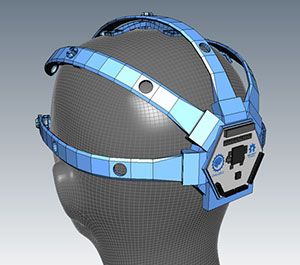— 3D Printing Industry
The phrase “we want to lower the barrier of entry for brain-computer interfaces” may be the strongest indicator yet that you are, indeed, living in the future. In order to achieve that futuristic dream, Conor Russomanno and Joel Murphy have launched what’s become the infomercial of the 21st Century, a Kickstarter campaign. It’s called OpenBCI and it’s an open-source, 3D printable brain scanner.
OpenBCI is built around a 24-bit analog-to-digital converter called the ADS1299, from Texas Instruments, which measures EEG, as well as EMG (skeletal muscle) and ECG (heart) signals. It’s Arduino compatible, with designs and software all available on GitHub. After printing out the Spider Claw 3000 headset, you can connect the OpenBCI board from the campaign, along with electrodes to attach to your scalp, and begin measuring brain waves for a variety of uses. The software from OpenBCI is compatible with a number of different open source platforms, such as Processing, so that you can take the data and apply it to your own projects. 3D printing makes the OpenBCI even more accessible as it allows users with a variety of head shapes and sizes to print a headset tailored to their own head. Watch the Kickstarter video for a more detailed idea of how the OpenBCI project works:
